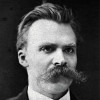“ artists never stand by themselves, standing alone is opposed to their deepest instincts. ”
Friedrich Nietzsche, On the Genealogy of Morality (1887). copy citation
| Author | Friedrich Nietzsche |
|---|---|
| Source | On the Genealogy of Morality |
| Topic | instinct artist |
| Date | 1887 |
| Language | English |
| Reference | |
| Note | Translated by Horace B. Samuel |
| Weblink | https://en.wikisource.org/wiki/The_Genealogy_of_Morals |
Context
“At all times they have played the valet of some morality, philosophy, or religion, quite apart from the fact that unfortunately they have often enough been the inordinately supple courtiers of their clients and patrons, and the inquisitive toadies of the powers that are existing, or even of the new powers to come. To put it at the lowest, they always need a rampart, a support, an already constituted authority: artists never stand by themselves, standing alone is opposed to their deepest instincts. So, for example, did Richard Wagner take, "when the time had come," the philosopher Schopenhauer for his covering man in front, for his rampart. Who would consider it even thinkable, that he would have had the courage for an ascetic ideal, without the support afforded him by the philosophy of Schopenhauer, without the authority of Schopenhauer, which dominated Europe in the seventies?”
source



